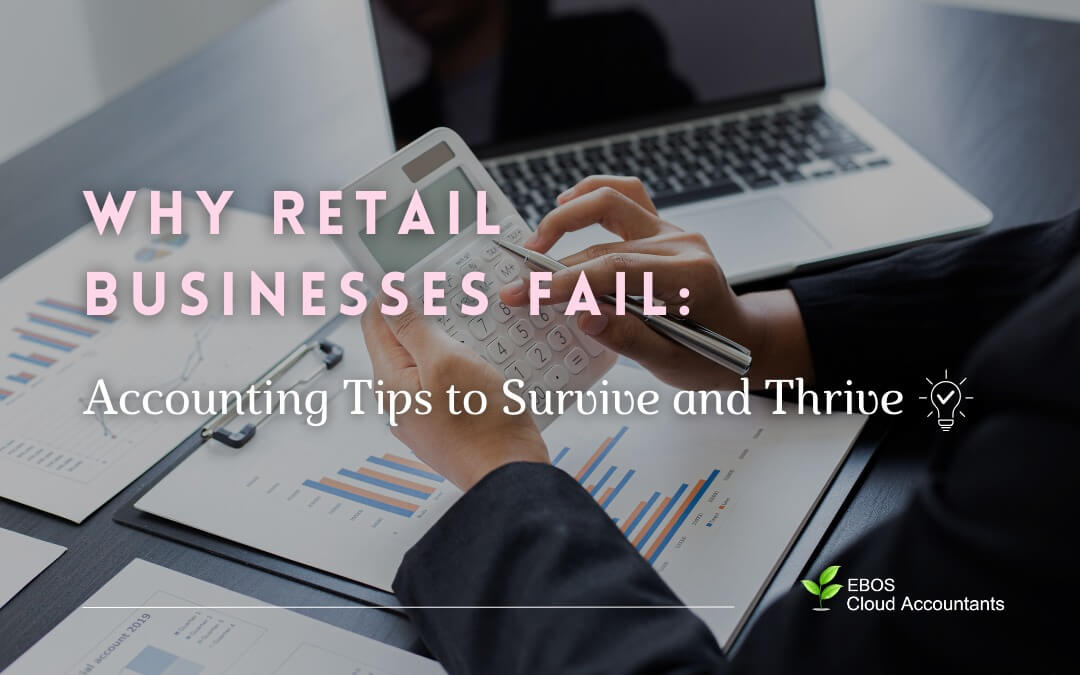Starting a retail business can be thrilling and fulfilling, but it also comes with many challenges and difficulties. Approximately 50% of small enterprises survive over the first five years, according to the Small Business Administration (SBA). It is a very low survival rate.
These mistakes are largely the result of inadequate bookkeeping procedures. In-depth accounting guidance is provided in this article to help retailers not just survive but prosper in the face of fierce market competition. The essay explores the reasons why retail firms fail.
Reasons Why Retail Businesses fail:
- Poor management of cash flow– Every company must have an effective cash flow management system. If bills and expenses are not paid on time, having insufficient finances might cause a retail business to face serious financial issues. Inadequate cash flow can occur for several reasons, including slow sales, high inventory costs, and poor strategies for collecting unpaid debts. Another of the several causes of this situation is a lack of account receivable services.
- Inaccurate records in finance– It’s essential to have precise financial records to support wise business decisions. Lacking a clear grasp of their incoming and outgoing cash, a retail shop owner who doesn’t keep precise financial records may find it difficult to make wise financial judgments.
- Failing to manage inventory– Inventory management issues can be a major concern for retail businesses because it is essential to generating sales. Excessive, insufficient, or out-of-date inventory are all possible outcomes of poor inventory management. These problems can seriously impair a company’s financial success.
- Lack of proper budget– Due to inadequate budgeting, retail enterprises must have a thorough understanding of their financial situation and develop appropriate measures.
- Failing to adapt to the changing market– Since the retail sector is always changing, failing to adapt to these changes can cause businesses to fall behind their competitors. To be competitive, retail organizations must constantly monitor shifting consumer patterns and adjust their strategy.
Accounting Tips for Retail Businesses:
- Keeping accurate financial records– Retail businesses must keep precise records of their income and expenses, including profits, the cost of stock ownership, employee compensation, and tax obligations. By maintaining accurate records, business owners may analyse trends, avoid financial troubles, and make educated decisions. Additionally, it’s important to have good records and control over accounts payable services.
- Management of cash flow– Retail companies must have a thorough understanding of their cash flow situation. It includes monitoring cash inflow and outflow, estimating cash needs, and coming up with a plan of action for dealing with financial shortages. Retail enterprises can avoid financial difficulties and ensure sufficient liquidity to fulfil their liabilities and expenses by managing cash inflows effectively.
- Effective inventory management– For retail businesses to align their stock levels with consumer demand and cut inventory costs, effective inventory management is essential. It calls for establishing exact demand forecasts, continuously monitoring inventory levels, and routinely assessing inventory performance.
- Maintain a budget– Making and following a well-planned budget that is regularly evaluated for accurate tracking is one wise strategy for retail enterprises to keep an eye on their financial success. Retail businesses can avoid wasteful expenditures and make sure they stay within their means of support by sticking to a budget.
- Implementation of technology– Retail businesses can significantly improve their operations by utilizing technology. For instance, they can improve inventory management, expedite accounting procedures, and improve customer interactions. Strategic technology investments can improve the productivity and competitiveness of retail businesses.
- Consult professionals– Retail enterprises should think about consulting with seasoned accountants and business experts. The knowledge of these professionals is quite helpful since they provide insightful guidance and recommendations regarding financial management, strategic tax planning, and other crucial factors required to guarantee the success of a retail firm.
Final Word
In the end, accounting expertise has a big impact on how successful retail businesses are. By avoiding common accounting mistakes and implementing efficient procedures, business owners can take the lead in a cutthroat industry and make wise judgments. They can effectively manage their finances by doing this.
Success depends on maintaining accurate records, paying close attention to financial reports, and utilizing technology to make accounting processes more efficient. Additionally, speaking with a qualified accountant can provide businesses with helpful perspectives and guidance on how to manage financial opportunities and challenges. Retail businesses can increase their profits, reduce risks, and achieve sustainability over time by building a solid accounting foundation.
EBOS Cloud Accountants provides Outsourced Accounting Services and renowned professionals in the industry. We have been serving high-profile clients for years and if you need any help, feel free to contact us!







